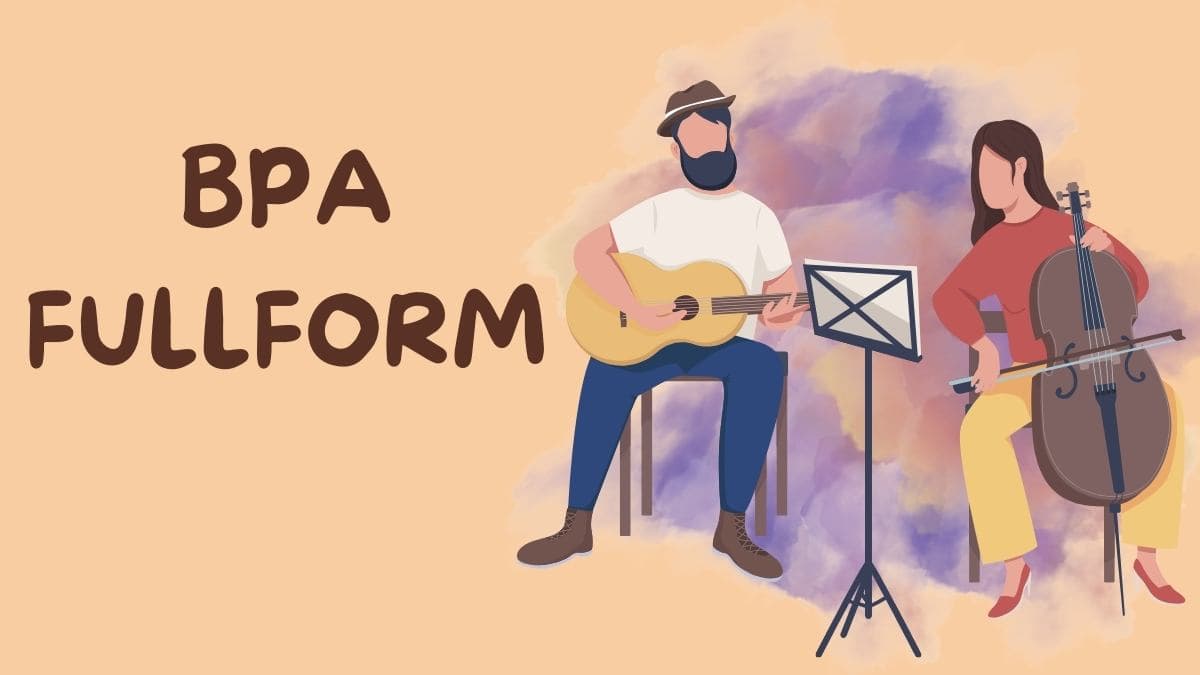What is BPA Full Form?
By Pinkey Sharma |
Date 02-09-2024

Table of Contents
Admissions Open for
The BPA Full Form in education stands for Bachelor of Performing Arts. The course's curriculum deals with courses that have required attention from students who have interests in the performing arts, consisting of music, dance, theater and other performance-oriented disciplines.The full form of BPA in education helps explain what this degree was created for: to give students a much-regimented education in the arts and prepare the students for careers in various performance-related fields. It stands for an educational degree which encompasses the combination of artistic training with academic learning.
History of BPA
Having known the BPA Full Form in education, now let us explore its history. BPA covers a rich history that is paralleled with the history of education in performing arts. Most performing arts education is traditionally informal and passed through apprenticeship, mentorship, and community involvement. However, the increase in demand for formal and professional arts training has led colleges and universities to standardize the programs.
Actually, the full form of BPA gained prominence in the 20th century when universities and colleges felt the need to have a University degree that would comprehensively train students in the performing arts. It was structured in such a way that the ideal balance between courses for practical performance skills and theoretical knowledge about the performing arts was maintained. With time, the course has grown extensive in its specializations, reflecting the diversity and evolution that the performing arts have undergone.
Eligibility Criteria for Attending BPA Examination
Students seeking to achieve a BPA course have to meet certain eligibility criteria. As many students are eager to know the full form of BPA, let us enlighten them on what generally comes under the banner of requirements for BPA:
Educational Background: The candidates should have passed their 12th class or any other such qualification, which is considered equivalent to this course by a recognized board. In short, the full form of the BPA course requires high school or any other equivalent qualification as the minimum requirement to seek admission in this course.
Talent and Skills: Many of the courses of BPAs have this as one of the requirements that is pivotal in nature while applying. Talent and skills in the area would be needed, and auditions with portfolio submissions might be necessary, covering candidates' performances in music, dance, or theatrical categories.
Entrance Tests: Sometimes, colleges also conduct entrance tests on the candidates to perceive their aptitude related to performing arts. These tests sometimes involve practical assessments or written tests that grade the applicant on artistic skill and its theoretical knowledge.
Interviews: Apart from exams and auditions, some courses would include interviews that determine the motivation of the candidate toward the performing arts, career goals, as well as the understanding of the course.
Primary Goals of BPA
BPA is the full form of Bachelor of Performing Arts; it includes a few primary objectives that help in enhancing the study as well as a career of students in the field of performing arts:
Artistic Development: The most important single goal of the BPA program is the artistic growth of its candidates in performance within their chosen discipline to include music, dance, theater, and others. This would also involve practical training in performance technique and style.
Understand Theory in the Arts: The BPA course-program places emphasis on understanding the theoretical inputs regarding performing arts, relating their historic, contextual, and cultural significance of various art forms. The theoretical knowledge learned here supplements the practical skills.
Prepare for Professional Careers: The BPA course will prepare students for professional careers in the performing arts and provide them with the skill set needed concerning performance, choreography, direction, among other professional areas. The program often encompasses various internship, workshop, and live performance opportunities.
Nurture Artistic Expression: The BPA program encourages students to develop their unique artistic voice and find ways of expression through medium. This may include creative processes and/or experimentation with various styles and techniques.
Nurture Collaborative Skills: Generally, performing arts involve something with other people; it might be in ensembles, theater performances, or other collaborative projects. In this regard, the BPA program trains its students with teamwork and collaboration skills to lead them on how to work effectively with their peers and mentors.
BPA Regional Offices
BPA stands for Bachelor of Performing Arts. It is a degree course pursued by students who have a keen interest in various modes of performing arts, including dance, music, theater, or drama. This BPA course is widely provided by many universities in the country and institutions of every region of the country through their regional offices.
These regional offices play a major role in administering and promoting the BPA programs. They facilitate contact between prospective students, current students, and alumni with the main campuses. This would open up avenues of required information on course details, admission procedures, and availability of scholarships to them, thus facilitating entry into these programs for more students.
In addition, such offices often hold workshops, seminars, and even some cultural events; these allow them to form a community of performing arts lovers in their regions. They thus also keep the students updated on new trends in the performing arts and afford them opportunities for showcasing their talents.
The institutions that are well known, among others, that have regional offices of BPA within the Indian sub-continent are the Indira Kala Sangeet Vishwavidyalaya, which is located in Chhattisgarh; Rabindra Bharati University, West Bengal; and the Banaras Hindu University's Faculty of Performing Arts, Uttar Pradesh.
The BPA regional offices in India are, therefore, vital centers that help students in the growth and development toward a performing arts career, giving opportunities to fresh talent from every part of the country.
Examinations conducted for BPA
Here's a view into the type of examinations that is generally conducted:
Practical examinations: These are the assessments where students have to take practical tests that show their ability to perform. In most cases, this can include auditions or live performances or practical tests in the field of study in acting, dance, or music.
Theoretical Assessments: In the BPA course, theoretical examinations are also taken to test the ability of the students to perceive theory as relating to the arts, history, and cultural perspectives. Such assessments may be in the form of a written test, essays, or even research projects.
Portfolio Reviews: Students are permitted to develop a portfolio concerning their work and accomplishments within the performing arts. The reviews of the portfolio assist in determining the growth and improvement achieved by them.
Final Projects: The final project or performance is the final phase of the BPA course. Students are capable of demonstrating talents and expertise learned through completing the undergraduate program.
Practicum Assessment: In case the program has a field practical training or internship, then students are assessed in relation to performance and contribution while in the field. Field supervisors and mentors assess.
Conclusion
The above information answers the question on the BPA full form in education. Bachelor of Performing Arts, and the course has been integrated for students inclined in the sphere of performing arts. The training would offer a full-fledged education by successfully harmonizing practical training with theoretical learning and equip graduates adequately for job employment within varied performance-related fields. The understanding of BPA's full form and what it aims to achieve will give students a very good idea of the importance of this degree and how it can integrate into their artistic and professional lives.
FAQs
1. Can a 12th pass apply for BPA?
Yes, 12th pass candidates who completed their schooling with a minimum qualification are eligible to apply for the BPA course. The full form of BPA demands high school or equivalent as its minimum eligibility criteria for admission.
2. What qualification does BPA stand for?
BPA is the short form of the Bachelor of Performing Arts degree qualification. It is basically an Undergraduate degree course that covers several branches of performing arts both practically as well as theoretically.
3. How many subjects are in BPA?
The number of courses in a BPA course would vary from one institution to another as well as the focus area. Core subjects contained in most curriculums are Performance Techniques, Arts Theory, History, and Practical Trainings. Various elective courses or specializations are provided depending on the career goals of and the interest of the student.
In this article, the use of the BPA full form can show in detail what a Bachelor of Performing Arts is. In so doing, the readers can have a wide-based view concerning the course, its establishment, purpose, and requirements. This information is basically meant for those willing to enroll in the course and others that might have an interest in performing arts.
Liked the above blog? Then, please feel free to share the blog with your friends to spread the knowledge on “BPA Full Form in Education”
Also Read,
BSW Full Form: Explore its role in social services, career prospects, and the impact it has on community development.
what is B.P.Ed Full form - Bachelor of Physical Education Explained
CBSE Schools In Popular Cities
- CBSE Schools in Bangalore
- CBSE Schools in Mumbai
- CBSE Schools in Pune
- CBSE Schools in Hyderabad
- CBSE Schools in Chennai
- CBSE Schools in Gurgaon
- CBSE Schools in Kolkata
- CBSE Schools in Indore
- CBSE Schools in Sonipat
- CBSE Schools in Delhi
- CBSE Schools in Rohtak
- CBSE Schools in Bhopal
- CBSE Schools in Aurangabad
- CBSE Schools in Jabalpur
- CBSE Schools in Jaipur
- CBSE Schools in Jodhpur
- CBSE Schools in Nagpur
- CBSE Schools in Ahmednagar
- CBSE School In Tumkur

Call Us to know more about Orchids
Swipe Up



.jpg&w=1920&q=80)












